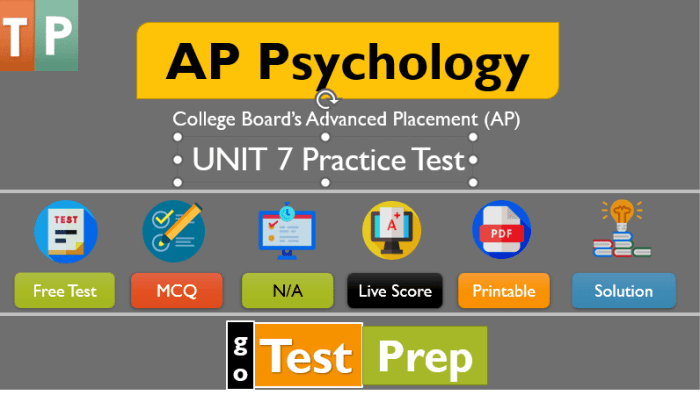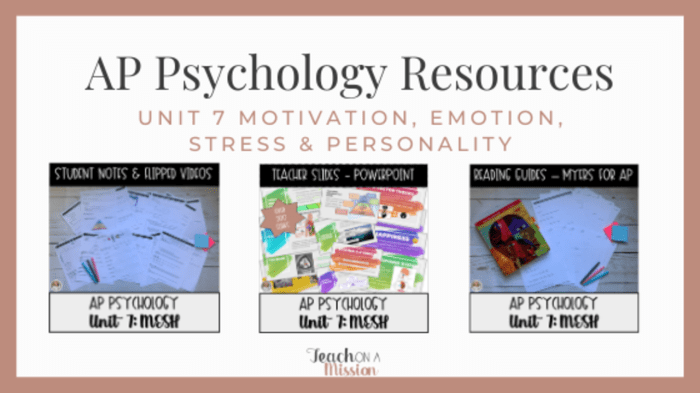Ap psych unit 7 practice test – Prepare for success in AP Psychology Unit 7 with our comprehensive practice test. Dive into the key concepts, theories, and perspectives covered in this unit, and master the skills necessary to excel on the exam.
This practice test is designed to provide you with a thorough understanding of the material, identify areas for improvement, and boost your confidence for the actual exam.
Unit 7 Overview
Unit 7 of AP Psychology explores the complex and multifaceted world of abnormal psychology. It delves into the nature of mental disorders, their causes, and the various approaches to their diagnosis and treatment. The unit also examines the ethical and legal issues surrounding mental health, highlighting the importance of informed consent and confidentiality.
Throughout the unit, students will engage with major theories and perspectives in abnormal psychology, including the medical model, the biopsychosocial model, and the cognitive-behavioral model. They will learn about the different diagnostic systems used to classify mental disorders, such as the Diagnostic and Statistical Manual of Mental Disorders (DSM-5).
Major Theories and Perspectives in Abnormal Psychology
The medical model, with its roots in the 19th century, views mental disorders as medical illnesses with identifiable causes, such as genetic predispositions or brain abnormalities. In contrast, the biopsychosocial model emphasizes the interplay of biological, psychological, and social factors in the development of mental disorders.
This model acknowledges the importance of genetics, neurochemistry, personality traits, and environmental stressors in shaping mental health.
The cognitive-behavioral model focuses on the role of maladaptive thoughts and behaviors in the development and maintenance of mental disorders. This model suggests that negative thought patterns and unhelpful behaviors can contribute to psychological distress and impair functioning.
Practice Test Questions: Ap Psych Unit 7 Practice Test

Practice test questions in AP Psychology are designed to assess students’ understanding of the course material and their ability to apply psychological concepts to real-world situations.
The test questions are categorized into four types: multiple choice, short answer, essay, and data analysis. Each type of question tests different skills and requires students to demonstrate their knowledge and understanding in different ways.
Multiple Choice Questions
Multiple choice questions are the most common type of question on the AP Psychology exam. They typically consist of a stem, which presents a question or scenario, and four answer choices. Students must choose the best answer from the options provided.
Multiple choice questions test students’ ability to:
- Recall and recognize key concepts and terms
- Identify relationships between different concepts
- Apply psychological principles to new situations
Short Answer Questions
Short answer questions require students to provide a brief, written response to a question or prompt. The responses are typically limited to a few sentences.
Short answer questions test students’ ability to:
- Explain key concepts and theories
- Describe research findings
- Apply psychological principles to specific situations
Essay Questions
Essay questions require students to write a more extended response to a question or prompt. The responses are typically several paragraphs long.
Essay questions test students’ ability to:
- Synthesize information from multiple sources
- Develop and support an argument
- Communicate their ideas clearly and concisely
Data Analysis Questions
Data analysis questions require students to analyze and interpret data from a graph, table, or chart. The questions may ask students to identify trends, draw conclusions, or make predictions.
Data analysis questions test students’ ability to:
- Understand and interpret data
- Draw conclusions from data
- Make predictions based on data
Test-Taking Strategies

Navigating the AP Psychology practice test demands effective strategies to optimize performance. This guide provides insights into proven techniques for tackling multiple choice, short answer, and essay questions, empowering you to manage time, identify key concepts, and structure your responses skillfully.
Multiple Choice Questions
Multiple choice questions assess your comprehension of fundamental concepts. Employ the following strategies:
- Read the question carefully, identifying the main concept being tested.
- Eliminate obviously incorrect options to narrow down your choices.
- Consider the context of the question and related information you have learned.
- Select the option that most accurately and comprehensively addresses the question.
Short Answer Questions
Short answer questions require concise, specific responses. To excel in these:
- Identify the key concept or idea being asked.
- Provide a brief, clear, and accurate answer that directly addresses the question.
- Use specific examples or evidence to support your response when possible.
- Avoid rambling or providing irrelevant information.
Essay Questions
Essay questions demand a more in-depth analysis and synthesis of concepts. To approach these effectively:
- Read the prompt carefully and identify the main topic and s.
- Brainstorm and organize your thoughts before writing.
- Structure your essay with a clear introduction, body paragraphs, and conclusion.
- Support your arguments with specific examples, evidence, and research.
- Proofread your essay carefully before submitting it.
Sample Questions and Answers
This section provides a range of sample practice test questions and detailed answer explanations. These questions cover various topics and question types, enabling you to assess your understanding of the unit’s key concepts.
Cognitive Development
Question: Piaget’s theory of cognitive development proposes that children’s cognitive abilities develop through a series of distinct stages. Describe the key characteristics of the preoperational stage.Answer: During the preoperational stage, children are characterized by egocentrism, centration, and a lack of reversibility.
Egocentrism refers to the inability to see things from another’s perspective. Centration refers to the tendency to focus on one aspect of a situation and ignore others. Reversibility refers to the inability to understand that actions can be reversed.
Moral Development
Question: Kohlberg’s theory of moral development posits that individuals progress through a series of moral stages as they mature. Explain the key principles of the post-conventional level of moral reasoning.Answer: The post-conventional level of moral reasoning is characterized by a focus on universal ethical principles and a concern for the well-being of all people.
Individuals at this level make moral decisions based on abstract principles and values, rather than on societal expectations or personal interests.
Language Development
Question: Vygotsky’s sociocultural theory emphasizes the role of social interaction in language development. How does this theory explain the process of language acquisition in children?Answer: Vygotsky’s theory suggests that children acquire language through interactions with more knowledgeable others, such as parents or teachers.
These interactions provide a “zone of proximal development,” where children are supported in learning new language skills and concepts beyond their current level of understanding.
Social Development
Question: Attachment theory explains the importance of early caregiver-child relationships for a child’s social and emotional development. Describe the key features of secure attachment.Answer: Secure attachment is characterized by a child’s sense of trust and confidence in their caregiver. Children with secure attachments feel loved, valued, and supported, and they develop a healthy sense of self-worth and emotional resilience.
Ace your AP Psych Unit 7 practice test with ease! Just like a canary symbolizes a warning of impending danger, this practice test will alert you to areas that need extra attention. Delve into the symbolism of the canary to uncover hidden meanings, what does a canary symbolize , and then return to your practice test to conquer those tricky concepts with confidence.
Personality Development
Question: Trait theories of personality suggest that individuals have relatively stable and enduring personality traits. Explain the “Big Five” personality traits and their significance.Answer: The “Big Five” personality traits are openness, conscientiousness, extroversion, agreeableness, and neuroticism. These traits are considered fundamental dimensions of personality and have been shown to be associated with a variety of life outcomes, such as job performance, relationship satisfaction, and overall well-being.
Practice Test Analysis
Analyzing your practice test results is crucial for identifying areas where you excel and areas that require improvement. This analysis will help you set targeted goals and develop a study plan to maximize your success.
Start by reviewing your test performance and identifying the topics or questions you answered correctly. These areas represent your strengths, and you can continue to build upon them. Next, focus on the questions you missed or answered incorrectly. These indicate areas of weakness that require additional attention.
Based on your analysis, set specific goals for improvement. Break down your weaknesses into smaller, manageable chunks. For example, if you struggled with the concept of operant conditioning, your goal could be to review the principles and practice applying them to different scenarios.
Develop a study plan that addresses your weaknesses while maintaining your strengths. Allocate more time to reviewing and practicing the topics you need to improve. Utilize resources such as textbooks, notes, online materials, and practice questions to reinforce your understanding.
Regularly review your progress and adjust your plan as needed.
Additional Resources
Complement your practice test with these supplemental materials to enhance your grasp of Unit 7 concepts:
Online Resources
- Crash Course Psychology: Unit 7- Learning https://www.youtube.com/watch?v=w5o-50DjI-A
- Khan Academy: Unit 7- Learning https://www.khanacademy.org/science/ap-psychology/ap-unit-7-learning
- Bozeman Science: Unit 7- Learning https://www.youtube.com/watch?v=pZ2YFaDR98U
Books and Articles, Ap psych unit 7 practice test
- “Learning” by E. L. Thorndike
- “Operant Conditioning” by B. F. Skinner
- “Cognitive Psychology” by Ulric Neisser
Websites
- American Psychological Association: Learning and Memory https://www.apa.org/science/about/psa/2011/03/learning-memory
- National Institute of Mental Health: Learning and Memory https://www.nimh.nih.gov/health/topics/learning-and-memory/index.shtml
- The Learning Scientists https://www.learningscientists.org/
Clarifying Questions
What topics are covered in the practice test?
The practice test covers all key concepts, theories, and perspectives discussed in Unit 7 of AP Psychology.
How can I use the practice test to improve my score?
By taking the practice test, you can identify your strengths and weaknesses, and focus your studies accordingly.
What are some tips for taking the practice test?
Approach the test strategically, manage your time wisely, and carefully consider each question.